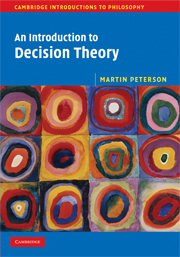Book contents
- Frontmatter
- Contents
- Preface
- 1 Introduction
- 2 The decision matrix
- 3 Decisions under ignorance
- 4 Decisions under risk
- 5 Utility
- 6 The mathematics of probability
- 7 The philosophy of probability
- 8 Why should we accept the preference axioms?
- 9 Causal vs. evidential decision theory
- 10 Bayesian vs. non-Bayesian decision theory
- 11 Game theory I: Basic concepts and zero-sum games
- 12 Game theory II: Nonzero-sum and cooperative games
- 13 Social choice theory
- 14 Overview of descriptive decision theory
- Appendix A Glossary
- Appendix B Proof of the von Neumann–Morgenstern theorem
- Further reading
- Index
10 - Bayesian vs. non-Bayesian decision theory
- Frontmatter
- Contents
- Preface
- 1 Introduction
- 2 The decision matrix
- 3 Decisions under ignorance
- 4 Decisions under risk
- 5 Utility
- 6 The mathematics of probability
- 7 The philosophy of probability
- 8 Why should we accept the preference axioms?
- 9 Causal vs. evidential decision theory
- 10 Bayesian vs. non-Bayesian decision theory
- 11 Game theory I: Basic concepts and zero-sum games
- 12 Game theory II: Nonzero-sum and cooperative games
- 13 Social choice theory
- 14 Overview of descriptive decision theory
- Appendix A Glossary
- Appendix B Proof of the von Neumann–Morgenstern theorem
- Further reading
- Index
Summary
The term Bayesianism appears frequently in books on decision theory. However, it is surprisingly difficult to give a precise definition of what Bayesianism is. The term has several different but interconnected meanings, and decision theorists use it in many different ways. To some extent, Bayesianism is for decision theorists (but not all academics) what democracy is for politicians: Nearly everyone agrees that it is something good, although there is little agreement on what exactly it means, and why it is good. This chapter aims at demystifying the debate over Bayesianism. Briefly put, we shall do two things. First, we shall give a rough characterisation of Bayesian decision theory. Second, we shall ask whether one can give any rational argument for or against Bayesianism.
What is Bayesianism?
There are almost as many definitions of Bayesianism as there are decision theorists. To start with, consider the following broad definition suggested by Bradley, who is himself a Bayesian.
Bayesian decision theories are formal theories of rational agency: they aim to tell us both what the properties of a rational state of mind are … and what action it is rational for an agent to perform, given the state of mind …
(Bradley 2007: 233)According to this definition, Bayesianism has two distinct components. The first tells us what your state of mind ought to be like, whilst the second tells us how you ought to act given that state of mind.
- Type
- Chapter
- Information
- An Introduction to Decision Theory , pp. 200 - 211Publisher: Cambridge University PressPrint publication year: 2009

